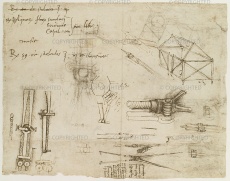Double Compasses
From Inventions
| Line 9: | Line 9: | ||
|descrizione= | |descrizione= | ||
| - | [[Reduction | + | [[Reduction Compasses | Reduction compasses]] for measuring simple proportional ratios and for enlarging or reducing drawings. The instrument was formed of two intersecting legs with points on all ends and a fixed or variable hinge pin depending on the desired proportional ratios. |
|componenti= | |componenti= | ||
Revision as of 10:52, 13 November 2009
Name probably in use since the sixteenth century (documented in the inventory of Federico Cesi’s belongings).
Contents |
Historic Period
1st C.?
Description
Reduction compasses for measuring simple proportional ratios and for enlarging or reducing drawings. The instrument was formed of two intersecting legs with points on all ends and a fixed or variable hinge pin depending on the desired proportional ratios.
Bibliographical Resources
Inventario dei beni di Federico Cesi, Roma, Bibl. Lincea e Corsiniana, Archivio Linceo 32, cc. 84v-102v (“Compasso doppio di proportione col centro mobile scudi uno 8,50”).
Nicolò, Anna; Solinas, Francesco. Per una analisi del collezionismo Linceo: L’Archivio Linceo 32 e il Museo di Federico Cesi, in Federico Cesi, Atti del Convegno (Acquasparta, 7-9 ottobre 1985) Roma, Accademia Nazionale dei Lincei, 1986, pp. 193-212, in part. pp. 206-212.
Oddi, Muzio. Fabbrica et uso del compasso polimetro, Milano 1633, proemio: “…uno di questi compassi, medesimamente con le punte doppie…”.
Existing Instruments
Florence, Museo Galileo. Institute and Museum of the History of Science, Inv. 633.
Florence, Museo Galileo. Institute and Museum of the History of Science, Inv. 3567.
Florence, Museo Galileo. Institute and Museum of the History of Science, Inv. 655.
Florence, Museo Galileo. Institute and Museum of the History of Science, Inv. 3686.
Images
Unavailable image
Giacomo Contarini,Figure d'Istromenti Matematici, ms, ca. 1590, Oxford, Bodleian Library, Ms. Canon. Ital. 145, c. 21, compasso doppio di Fabrizio Mordente. |
Author of the entry: Filippo Camerota

